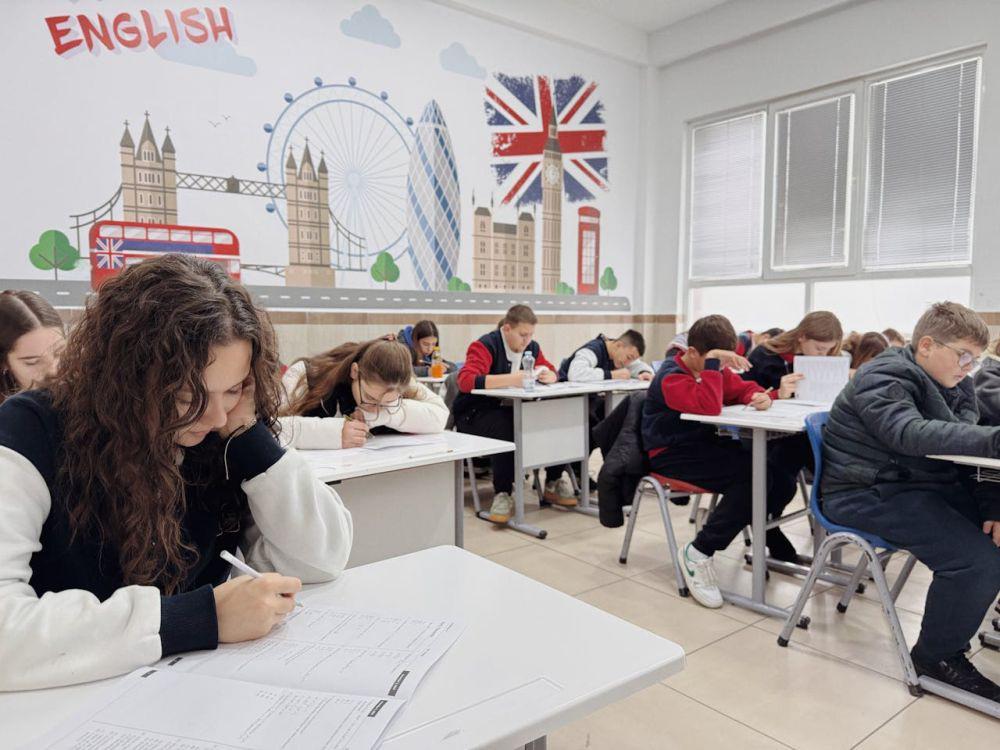100 Soal TOEFL dan Jawabannya, Lengkap Setiap Subtesnya!

- TOEFL adalah ujian standar internasional untuk mengukur kemampuan Bahasa Inggris seseorang, terutama dalam konteks akademik.
- TOEFL memiliki empat subtes utama yang meliputi Listening, Reading, Speaking, dan Writing. Latihan soal TOEFL sangat penting untuk mendapatkan hasil maksimal.
- Contoh soal-soal TOEFL meliputi tes tata bahasa, pemahaman bacaan, percakapan, sinonim, dan kosakata dalam konteks.
TOEFL (Test of English as a Foreign Language) merupakan ujian standar internasional yang digunakan untuk mengukur kemampuan Bahasa Inggris seseorang, terutama dalam konteks akademik. Ujian ini penting bagi siapa saja yang ingin melanjutkan studi di luar negeri atau bekerja di perusahaan multinasional.
TOEFL memiliki empat subtes utama yang meliputi Listening, Reading, Speaking, dan Writing. Untuk mendapatkan hasil maksimal, tentunya kamu harus sering mengisi latihan soal. Yuk, simak di bawah ini contoh soal TOEFL dan jawabannya!
1. Soal tentang sentence completion (Grammar)

1. The book ___ on the table belongs to me.
A. lying
B. lays
C. lain
D. lay
2. If she ___ more carefully, she would have avoided the accident.
A. drives
B. drove
C. had driven
D. has driven
3. The teacher insisted that each student ___ the test before leaving. A. takes
B. take
C. took
D. taking
4. Not until the 19th century ___ a common practice.
A. was blood transfusion
B. blood transfusion was
C. has blood transfusion been
D. is blood transfusion
5. The manager asked that John ___ to the meeting on time.
A. comes
B. came
C. come
D. will come
6. The scientists ___ a new type of vaccine in their recent research.
A. develop
B. developing
C. developed
D. have developing
7. The longer you wait, the ___ it will be to get a ticket.
A. difficult
B. more difficult
C. most difficult
D. difficulty
8. Had he studied harder, he ___ the test.
A. would pass
B. would have passed
C. will pass
D. passes
9. The book, along with the magazines, ___ on the table.
A. is
B. are
C. were
D. be
10. No sooner ___ the meeting started than the power went out.
A. has
B. had
C. was
D. did
11. The project must be completed ___ the deadline.
A. in
B. on
C. by
D. with
12. She prefers ___ tea rather than coffee.
A. drink
B. to drink
C. drinking
D. drank
13. The baby ___ loudly when his mother left the room.
A. cries
B. cried
C. crying
D. cry
14. He is the man ___ car was stolen last night.
A. who
B. whom
C. whose
D. which
15. Neither the teacher nor the students ___ happy with the test results.
A. is
B. are
C. was
D. were
2. Contoh soal error identification

16. The teacher asked the students to read quietly and not disturbing others.
A. asked
B. quietly
C. not disturbing (Seharusnya "not to disturb.")
D. others
17. Because of his laziness, he failed passing the final exam.
A. Because
B. laziness
C. passing (Seharusnya "to pass.")
D. final exam
18. The police officer warned us do not enter the restricted area.
A. The police officer
B. warned us
C. do not enter (Seharusnya "not to enter.")
D. the restricted area
19. The professor said that the book was too hard for the students to understand it.
A. The professor
B. too hard
C. to understand it (Seharusnya "to understand.")
D. for the students
20. The children enjoyed to watch the animated movie last night.
A. The children
B. enjoyed
C. to watch (Seharusnya "watching.")
D. the animated movie
21. The committee has decided postponing the event until next month.
A. The committee
B. has decided
C. postponing (Seharusnya "to postpone.")
D. until next month
22. This is one of the books that was written by Shakespeare.
A. one
B. the books (Seharusnya "were written.")
C. was written
D. by Shakespeare
23. If he will come to the party, we will be happy.
A. If
B. will come (Seharusnya "comes.")
C. we
D. will be
24. Each of the students have to submit their assignment by Friday.
A. Each
B. have to (Seharusnya "has to.")
C. submit
D. by Friday
25. My father said that he has visited Japan last year.
A. My father
B. said
C. has (Seharusnya "had.")
D. last year
3. Contoh soal listening

Di section pertama, biasanya akan ada audio singkat.
26. Man: Did you finish your research paper?
Woman: Not yet. I still need to check some references.
Narrator: What does the woman mean?
A. She has completed her paper.
B. She still has work to do.
C. She lost her references.
D. She will start writing soon.
27. Woman: I can’t believe it’s raining again. We were supposed to have a picnic today!
Man: Well, that’s typical for spring in this city.
Narrator: What does the man imply?
A. The picnic is canceled.
B. He is surprised by the rain.
C. The weather is unusual.
D. It often rains in the spring.
28. Man: Could you tell me where the student bookstore is?
Woman: It’s just across from the library.
Narrator: Where is the bookstore located?
A. Next to the library.
B. Behind the library.
C. In front of the library.
D. Inside the library.
29. Woman: My history professor speaks so quickly. I can barely keep up with my notes.
Man: Why don’t you record the lecture and take notes later?
Narrator: What does the man suggest?
A. Writing faster notes.
B. Asking the professor to slow down.
C. Recording the lecture.
D. Dropping the history class.
30. Man: I can’t believe how expensive textbooks are these days!
Woman: Tell me about it. I spent a fortune last semester.
Narrator: What does the woman mean?
A. She didn’t buy any textbooks.
B. She saved a lot of money.
C. She understands the man’s frustration.
D. She thinks textbooks are cheap.
Section kedua, biasanya akan ada percakapan yang lebih panjang.
Conversation 1
Narrator: Listen to a conversation between two students.
Woman: Hey, do you know when the library closes today?
Man: Yeah, I checked the website. It closes at 10 p.m. on weekdays and 8 p.m. on weekends.
Woman: Oh, good! I still have time to return my books.
Man: Just make sure you return them before the due date, or there’s a late fee.
31. What time does the library close on weekdays?
A. 8 p.m.
B. 9 p.m.
C. 10 p.m.
D. 11 p.m.
32. What advice does the man give?
A. To check the website for updates.
B. To return books on time.
C. To avoid the library on weekends.
D. To study at home instead.
Conversation 2
Narrator: Listen to a conversation between a professor and a student.
Student: Professor, I need some help with my research paper.
Professor: Sure! Have you decided on a topic?
Student: Yes, I want to write about climate change and its impact on agriculture.
Professor: That’s a great topic. I recommend checking the university’s online journal database for sources.
33. What is the student asking for?
A. Help with a research paper.
B. An extension on a deadline.
C. Permission to change topics.
D. A higher grade on an assignment.
34. What topic did the student choose?
A. Pollution in cities.
B. Climate change and agriculture.
C. Renewable energy.
D. Water conservation.
35. What does the professor suggest?
A. Reading the textbook again.
B. Looking for sources in the university’s journal database.
C. Interviewing farmers about climate change.
D. Changing the research topic.
4. Contoh soal reading

Passage 1: The Amazon Rainforest
The Amazon Rainforest, often called the "lungs of the Earth," produces approximately 20% of the world's oxygen and is home to millions of plant and animal species. It covers parts of nine countries in South America, with the majority located in Brazil. However, deforestation due to logging, agriculture, and urban expansion threatens the rainforest’s biodiversity. Conservation efforts are being made to protect this vital ecosystem, but illegal activities continue to pose challenges.
36. What is the Amazon Rainforest often called?
A. The Heart of South America
B. The Lungs of the Earth
C. The Green Continent
D. The World’s Largest Park
37. According to the passage, what is one major threat to the Amazon Rainforest?
A. Natural disasters
B. Illegal deforestation
C. Excessive rainfall
D. Wildfires caused by lightning
38. Which of the following is NOT mentioned as a cause of deforestation in the Amazon?
A. Logging
B. Agriculture
C. Tourism
D. Urban expansion
Passage 2: The History of the Internet
The Internet was initially developed in the 1960s as a military project called ARPANET. It was designed to enable communication between researchers in different locations. By the 1990s, it had evolved into a global network connecting businesses, governments, and individuals. The invention of the World Wide Web by Tim Berners-Lee in 1989 played a crucial role in making the Internet accessible to the general public. Today, the Internet is essential for communication, commerce, and education worldwide.
39. What was the original purpose of ARPANET?
A. Online shopping
B. Military communication
C. Entertainment
D. Social networking
40. Who invented the World Wide Web?
A. Steve Jobs
B. Bill Gates
C. Tim Berners-Lee
D. Mark Zuckerberg
41 According to the passage, which of the following is NOT mentioned as a modern use of the Internet?
A. Communication
B. Commerce
C. Education
D. Agriculture
Passage 3: The Importance of Sleep
Sleep plays a critical role in maintaining physical and mental health. Studies show that adults need between 7 to 9 hours of sleep per night to function optimally. Lack of sleep can lead to a weakened immune system, memory problems, and increased risk of heart disease. Experts recommend maintaining a consistent sleep schedule, avoiding caffeine before bed, and creating a relaxing bedtime routine to improve sleep quality.
42. What is one effect of sleep deprivation?
A. Improved concentration
B. Weakened immune system
C. Increased energy levels
D. Faster metabolism
43. What is one tip mentioned in the passage for improving sleep quality?
A. Drinking coffee before bed
B. Sleeping at different times every day
C. Maintaining a consistent sleep schedule
D. Exercising right before sleeping
Passage 4: The Benefits of Learning a Second Language
Learning a second language has numerous cognitive and social benefits. Studies have shown that bilingual individuals have better problem-solving skills and greater cognitive flexibility. Additionally, knowing more than one language can improve job prospects and cultural understanding. While learning a language as an adult can be challenging, regular practice and immersion in the language environment can significantly enhance fluency.
44. According to the passage, which is NOT a benefit of learning a second language?
A. Better problem-solving skills
B. Greater cognitive flexibility
C. Increased risk of memory loss
D. Improved job prospects
45. What is one effective way to improve fluency in a second language?
A. Memorizing vocabulary lists only
B. Immersing oneself in a language environment
C. Avoiding conversations with native speakers
D. Studying only grammar rules
Passage 5: The Great Wall of China
The Great Wall of China is one of the most famous landmarks in the world. Built over several centuries, the wall was originally constructed to protect China from invasions. It stretches over 13,000 miles and is made of stone, brick, wood, and other materials. Today, it is a popular tourist attraction and a UNESCO World Heritage Site.
46. What was the original purpose of the Great Wall of China?
A. To connect different parts of China
B. To serve as a trade route
C. To protect against invasions
D. To mark the border of China
47. What materials were used to build the Great Wall?
A. Stone and brick
B. Only wood
C. Glass and metal
D. Concrete and steel
Passage 6: The Water Cycle
The water cycle describes how water moves through the environment. Water evaporates from oceans and lakes, forming clouds through condensation. These clouds then release water as precipitation, such as rain or snow, which returns to the Earth's surface. This cycle is crucial for maintaining ecosystems and providing fresh water.
48. What is the first step of the water cycle?
A. Precipitation
B. Evaporation
C. Condensation
D. Runoff
49. How does water return to the Earth's surface?
A. Evaporation
B. Condensation
C. Precipitation
D. Freezing
Passage 7: The Importance of Exercise
Regular exercise is essential for maintaining good health. It strengthens muscles, improves heart function, and boosts mental well-being. Experts recommend at least 150 minutes of moderate exercise per week. Simple activities like walking, cycling, and swimming can significantly benefit overall health.
50. According to the passage, what is one benefit of exercise?
A. It weakens muscles
B. It improves heart function
C. It decreases mental well-being
D. It increases stress levels
51. How much exercise is recommended per week?
A. 60 minutes
B. 100 minutes
C. 150 minutes
D. 300 minutes
Passage 8: Renewable Energy
Renewable energy sources, such as solar, wind, and hydropower, are gaining popularity as alternatives to fossil fuels. These energy sources are sustainable and help reduce carbon emissions. Many countries are investing in renewable energy to combat climate change and decrease dependence on nonrenewable resources.
52. What is an example of a renewable energy source?
A. Coal
B. Natural gas
C. Solar power
D. Petroleum
53 Why are countries investing in renewable energy?
A. To increase carbon emissions
B. To reduce dependence on fossil fuels
C. To make electricity more expensive
D. To use up nonrenewable resources faster
Passage 9: The Role of Bees in Pollination
Bees play a crucial role in pollination, which is essential for plant reproduction. As bees collect nectar from flowers, they transfer pollen between plants, allowing them to produce fruits and seeds. Unfortunately, bee populations are declining due to habitat loss, pesticide use, and climate change. Conservation efforts are necessary to protect these important pollinators.
54. What role do bees play in plant reproduction?
A. They eat plant leaves
B. They transfer pollen
C. They stop plants from growing
D. They destroy flowers
55. What is one reason bee populations are declining?
A. Increased rainfall
B. Habitat loss
C. Rising bee populations
D. Better conservation efforts
5. Contoh soal written expression

Dalam sub tes ini, biasanya kamu akan diminta untuk mencari kesalahan dalam sebuah kalimat.
56. The teacher suggested (A) that each student write (B) a summary about (C) the chapter before Friday (D).
Jawaban: (C) => seharusnya of bukan about (a summary of the chapter).
57. The committee is (A) looking forward to hear (B) the president’s speech (C) next Monday (D).
Jawaban: (B) => seharusnya hearing bukan hear (karena look forward to diikuti gerund).
58. Because (A) of the storm, the pilot decided (B) to take a different route rather then (C) flying directly to New York (D).
Jawaban: (C) => seharusnya rather than bukan rather then.
59. Despite of (A) his lack of experience, he managed to complete the project on time (B) and within budget (C) as expected by the team (D).
Jawaban: (A) => seharusnya Despite saja, bukan Despite of.
60. The company has been (A) in business for over twenty years (B) and continues growing (C) despite the economic(D) downturn.
Jawaban: (C) => seharusnya to grow bukan growing (karena setelah continues lebih umum digunakan to infinitive).
61. Neither the manager nor (A) the employees was (B) happy with the new working (C) conditions in the office (D).
Jawaban: (B) => seharusnya were bukan was (karena employees adalah jamak).
62. She told (A) us that she would not have attended (B) the meeting if she had known (C) that it was canceled (D).
Jawaban: (D) => seharusnya had been canceled bukan was canceled (karena ini bentuk third conditional).
63. I don’t remember (A) where I left (B) my keys, but I’m sure they are laying (C) somewhere in the house (D).
Jawaban: (C) => seharusnya are lying bukan are laying (lay membutuhkan objek).
64. The professor demands (A) that the students are submitting (B) their assignments before (C) the deadline next week (D).
Jawaban: (B) => seharusnya submit bukan are submitting (karena demand diikuti subjunctive).
65. The book which (A) he recommended me to read (B) was quite interesting (C) and informative(D).
Jawaban: (B) => seharusnya he recommended that I read bukan he recommended me to read.
66. The doctor insisted (A) that his patient is staying (B) in the hospital for at least (C) another three days (D).
Jawaban: (B) => seharusnya stay bukan is staying (karena insist diikuti subjunctive).
67. She is one of the few students who (A) has (B) been selected for (C) the national debate competition (D).
Jawaban: (B) => seharusnya have bukan has (karena subjek sebenarnya adalah students).
68. My sister took (A) a course in French last summer, and now she can speak (B) it fluent (C) with her colleagues(D).
Jawaban: (C) => seharusnya fluently bukan fluent (karena digunakan sebagai adverb).
69. Each of the students in the class (A) have (B) completed their assignments (C) before the deadline last Friday(D).
Jawaban: (B) => seharusnya has bukan have (karena Each dianggap sebagai singular subject).
70. The research which was conducted (A) by the scientists aims (B) to find a solution for reducing(C) pollution in the ocean (D).
Jawaban: (C) => seharusnya to reduce bukan for reducing (aims to).
71. The new policy will affect (A) all employees who (B) have worked here since (C) more than five years ago (D).
Jawaban: (D) => seharusnya for more than five years bukan since more than five years ago.
72. The meeting has postponed (A) because many members were unable (B) to attend due to (C) the heavy rain (D).
Jawaban: (A) => seharusnya has been postponed bukan has postponed.
73. The company offers (A) a competitive salary as well as (B) opportunities for promotion (C) to employees who performs well (D).
Jawaban: (D) => seharusnya who perform well bukan who performs well (karena employees jamak).
74. If I was you (A), I would have accepted (B) the job offer (C) immediately without hesitation (D).
Jawaban: (A) => seharusnya If I were you bukan If I was you (karena ini conditional).
75. The scientist was surprising (A) by the results of his experiment, (B) which showed a significant decrease (C) in pollution levels over time (D).
Jawaban: (A) => seharusnya was surprised bukan was surprising (karena surprised untuk perasaan, surprising untuk situasi).
6. Vocabulary

Pilih jawaban yang memiliki arti paling mendekati kata yang dicetak tebal dalam kalimat berikut.
Sinonim
76. The scientist made a crucial discovery that changed the course of medicine.
A. Insignificant
B. Important
C. Simple
D. Unnecessary
77. The manager was reluctant to approve the project due to budget constraints.
A. Willing
B. Hesitant
C. Excited
D. Certain
78. The hotel staff provided exceptional service to all guests.
A. Ordinary
B. Unremarkable
C. Outstanding
D. Disappointing
79. The evidence was compelling enough to convince the jury.
A. Weak
B. Persuasive
C. Doubtful
D. Unclear
80. The professor gave a concise explanation of the theory.
A. Detailed
B. Brief
C. Confusing
D. Lengthy
81. The medicine helped alleviate his pain after surgery.
A. Worsen
B. Reduce
C. Increase
D. Ignore
82. The company’s profits plummeted after the financial crisis.
A. Increased
B. Dropped sharply
C. Remained stable
D. Fluctuated
83. The committee endorsed the candidate for the leadership position.
A. Opposed
B. Supported
C. Ignored
D. Rejected
84. The CEO made a prudent decision regarding the company’s future.
A. Reckless
B. Careful
C. Rushed
D. Thoughtless
85. The law aims to prohibit smoking in public places.
A. Allow
B. Forbid
C. Encourage
D. Ignore
Kosakata dalam Konteks
86. The new regulations will take effect next month.
A. Be ignored
B. Become valid
C. Be postponed
D. Be removed
87. The scientist was known for her pioneering work in genetics.
A. Traditional
B. Innovative
C. Irrelevant
D. Imitative
88. The student was apprehensive about the final exam.
A. Excited
B. Confident
C. Nervous
D. Unconcerned
89. The event was postponed due to heavy rain.
A. Delayed
B. Canceled
C. Rescheduled
D. Extended
90. The government implemented new policies to mitigate pollution.
A. Increase
B. Reduce
C. Ignore
D. Promote
91. The writer was known for his lucid style of writing.
A. Confusing
B. Clear
C. Boring
D. Complicated
93. The employees were compensated for their overtime work.
A. Punished
B. Paid
C. Ignored
D. Reprimanded
94. The teacher’s lecture was monotonous, making it difficult to stay focused.
A. Boring
B. Exciting
C. Dynamic
D. Informative
95. The speaker’s message was ambiguous and left the audience confused.
A. Clear
B. Unclear
C. Persuasive
D. Interesting
96. The town was devastated by the hurricane.
A. Destroyed
B. Strengthened
C. Beautified
D. Unaffected
7. Speaking

97. Describe a place you enjoy visiting and explain why it is special to you.
(Jawaban ideal mencakup deskripsi tempat, alasan mengapa disukai, dan pengalaman pribadi)
98. What is one skill that you think everyone should learn? Explain your reason.
(Sebutkan satu keterampilan penting, misalnya komunikasi, memasak, atau coding, lalu jelaskan manfaatnya)
99. Do you prefer studying alone or in a group? Why?
(Pilih salah satu, jelaskan alasan, berikan contoh pengalaman)
100. Discuss how social media affects communication, based on a given reading and listening passage.
(Gabungkan informasi dari teks dan audio, jelaskan dampak positif dan negatif media sosial)
Itu dia beberapa contoh soal TOEFL yang bisa kamu pakai untuk latihan. Semoga membantu, ya!














































